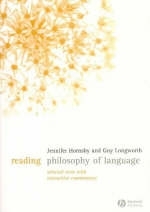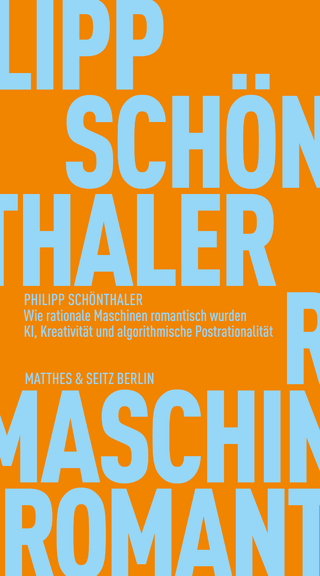
Reading Philosophy of Language
Wiley-Blackwell (Verlag)
978-1-4051-2484-3 (ISBN)
Designed for readers new to the subject, Reading Philosophy of Language presents key texts in the philosophy of language together with helpful editorial guidance.
A concise collection of key texts in the philosophy of language
Ideal for readers new to the subject.
Features seminal texts by leading figures in the field, such as Austin, Chomsky, Davidson, Dummett and Searle.
Presents three texts on each of five key topics: speech and performance; meaning and truth; knowledge of language; meaning and compositionality; and non-literal meaning.
A volume introduction from the editors outlines the subject’s principal concerns.
Introductions to each chapter locate the pieces in context and explain relevant terminology and theories.
Interactive commentaries help readers to engage with the texts.
Jennifer Hornsby is Professor of Philosophy at Birkbeck College, University of London. Reading Philosophy: Selected Texts with a Method for Beginners (co-edited with Samuel Guttenplan and Christopher Janaway, Blackwell, 2003) is among her recent publications. Guy Longworth is Lecturer in Philosophy at Birkbeck College, University of London.
Sources and Acknowledgements. Introduction.
1. Reference and Meaning:.
Introduction.
Introduction to Locke.
John Locke, ‘Of Words’ (extracts from An Essay Concerning Human Understanding).
Commentary on Locke.
Introduction to Mill.
J.S. Mill, ‘On Names’ (extracts from System of Logic).
Commentary on Mill.
Introduction to Frege.
Gottlob Frege ‘On Sense and Reference’ (extract).
Commentary on Frege.
Conclusion.
2. Speech and Action:.
Introduction.
Introduction to Austin.
J.L. Austin, ‘Performative Utterances’.
Commentary on Austin.
Introduction to Alston.
William P. Alston, ‘Meaning and Use’.
Commentary on Alston.
Introduction to Searle.
John R. Searle, ‘Meaning’ (extracts from Speech Acts).
Commentary on Searle.
Conclusion.
3. Meaning and Truth:.
Introduction.
Introduction to Davidson.
Donald Davidson, ‘Radical Interpretation’.
Commentary on Davidson.
Introduction to Soames.
Scott Soames, ‘Semantics and Semantic Competence’ (extract).
Commentary on Soames.
Introduction to Wright.
Crispin Wright, ‘Theories of Meaning and Speakers’ Knowledge’ (extract).
Commentary on Wright.
Conclusion.
Appendix: Tarski’s Truth-theoretic Machinery.
4. Knowledge of Language:.
Introduction.
Introduction to Chomsky.
Noam Chomsky, ‘Knowledge of Language as a Focus of Inquiry’ (extracts from Knowledge of Language).
Commentary on Chomsky.
Introduction to Dummett.
Michael Dummett, ‘What do I know when I know a language?’.
Commentary on Dummett.
Introduction to Campbell.
John Campbell, ‘Knowledge and Understanding’.
Commentary on Campbell.
Conclusion.
5. Meaning and Compositionality:.
Introduction.
Introduction to Horwich.
Paul Horwich, ‘The Composition of Meanings’ (extracts from Meaning).
Commentary on Horwich.
Introduction to Higginbotham.
James Higginbotham, ‘A Perspective on Truth and Meaning’ (extracts).
Commentary on Higginbotham.
Introduction to Pietroski.
Paul Pietroski, ‘The Undeflated Domain of Semantics’.
Commentary on Pietroski.
Conclusion.
6. Non-literal Meaning:.
Introduction.
Introduction to Bergmann.
Merrie Bergmann, ‘Metaphorical Assertions’.
Commentary on Bergmann.
Introduction to Davies.
Martin Davies, ‘Idiom and Metaphor’.
Commentary on Davies.
Introduction to Bach.
Kent Bach, ‘Speaking Loosely: Sentence Non-Literality’.
Commentary on Bach.
Conclusion.
Further Reading.
Index
| Erscheint lt. Verlag | 3.11.2005 |
|---|---|
| Reihe/Serie | Reading Philosophy |
| Verlagsort | Hoboken |
| Sprache | englisch |
| Maße | 173 x 249 mm |
| Gewicht | 680 g |
| Themenwelt | Geisteswissenschaften ► Philosophie ► Sprachphilosophie |
| ISBN-10 | 1-4051-2484-9 / 1405124849 |
| ISBN-13 | 978-1-4051-2484-3 / 9781405124843 |
| Zustand | Neuware |
| Informationen gemäß Produktsicherheitsverordnung (GPSR) | |
| Haben Sie eine Frage zum Produkt? |
aus dem Bereich


